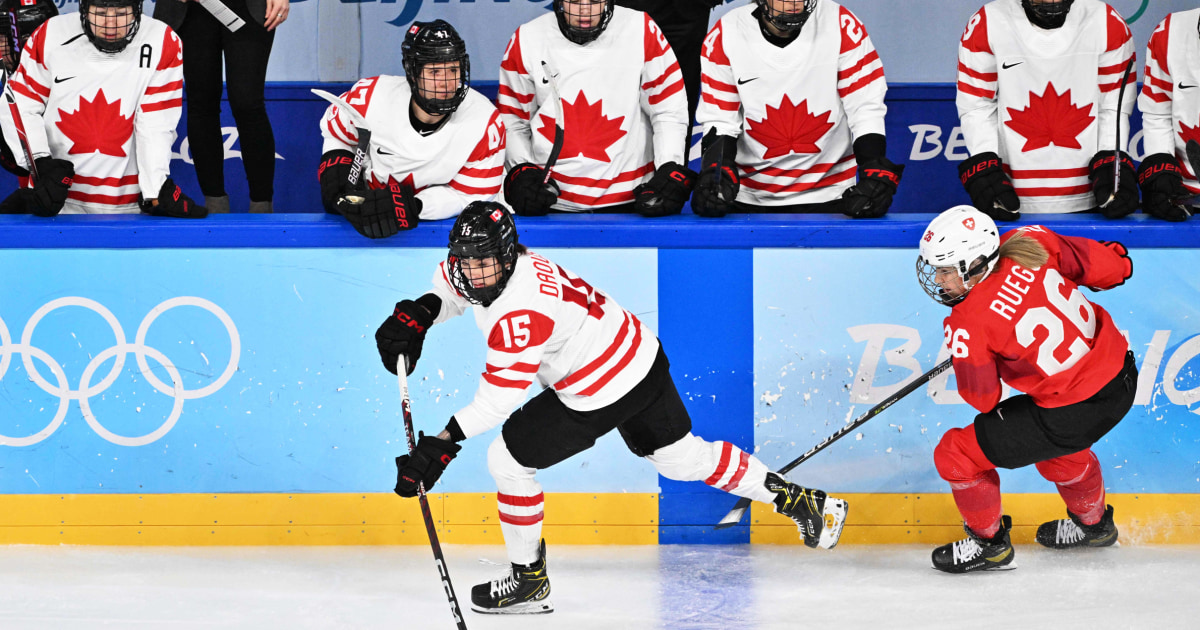
The Canadian and U.S. women’s ice hockey teams face off Wednesday in the Olympic finals, looking to settle the score on one of the world’s biggest sports rivalries for another four years.
It will be a heated competition between teams that have monopolized gold and met in every final but one since the sport was introduced to the Winter Olympics in 1998. In Beijing, the undefeated Canadians have steadily skated and scored their way toward unseating the reigning champions: Team USA.
But it’s not just the Canadians’ impressive campaign for gold that has garnered them attention at the pandemic-inflected Winter Games: Seven of their competing players are openly LGBTQ, making them tied for the queerest Olympic team of all time. (The Dutch women’s soccer team also had seven publicly out players who competed in the Tokyo Summer Games.)
“Women’s hockey gets more attention during the Olympics than at any other point,” Cyd Zeigler, the founder of LGBTQ sports website Outsports, told NBC News. “When you’re seeing all of these athletes in sports that just don’t get a lot of attention for four years, having them be out in this moment is so important.”
According to Outsports, half of the 10 women’s hockey teams in Beijing include at least one out player. But at seven, Canada’s percentage of players far outranks the others.
With every Olympics, visibility around LGBTQ athletes grows, thanks to both individual competitors and an increase in the sheer number of athletes who are publicly out. Outsports estimated that at least 36 openly LGBTQ athletes, from 14 different countries, are competing in Beijing. That’s double the amount from 2018, in Pyeongchang, but significantly less than the last Summer Olympics, which typically has more than triple the number of athletes competing compared to the Winter Games. Last year, at the Summer Games in Tokyo, there were an estimated, record-breaking 186 openly LGBTQ Olympians.
“Eight years ago, there had never been an out gay figure skater at the Olympics,” Zeigler said, drawing a comparison between figure skating and hockey. “Things have changed dramatically — just how bold people are willing to be in sports — in a pretty short period of time.”
Star power
Among the Canadian team’s LGBTQ players are stars Brianne Jenner and Erin Ambrose. In her third Olympic appearance, Jenner is the top goal-scorer in the tournament, looking to add another medal to her existing gold and silver. Ambrose, making her Olympic debut, is the tournament’s top goal-scoring defender and one of the team’s powerhouse players.
This star power has been a major factor in the impact of the Canadians’ queer contingency at the games. As Zeigler pointed out, it’s not just the number of players on Team Canada who are out, it’s that some of the best players on the team — and hence, in the world — are out.
It’s similar to the effect that top athletes, such as Megan Rapinoe and Abby Wambach, have had in women’s soccer. As Rapinoe, Wambach and many other LGBTQ players have been vocal about their personal lives, the sport has seen an increase in queer visibility and mainstream acceptance of its queer athletes. Like the Olympics, and the women’s events in particular, the last women’s World Cup saw an exponential increase in openly LGBTQ players.
But top scorers and star players aren’t the only people changing the culture of elite sports. Zeigler emphasized that there’s also a lot of power in backup and reserve players being out, as it dispels the fear that only the most well-known athletes are safe to live openly.
“When one teammate comes out and is accepted, it makes it that much easier for other people to do it, and more likely that they will,” Zeigler said. “We can point to examples in men’s sports and women’s sports, but I think that the Canadian women’s ice hockey team is a great example of that.”
“There’s a culture there that is empowered by out athletes. And it just, kind of, feeds in on itself — this snowball effect,” he said.
Like in professional and other elite sports arenas, openly LGBTQ female Olympians far outnumber their male counterparts, a fact that has been attributed to the much more stigmatizing culture of men’s athletics. In Beijing, men make up about a third of Outsports’ list of openly gay athletes, compared to a reported 1 to 9 ratio at the Tokyo Games.
The Beijing Olympics women’s hockey final starts on Wednesday at 11:10 p.m. ET.
Follow NBC Out on Twitter, Facebook & Instagram
Source: | This article originally belongs to Nbcnews.com










